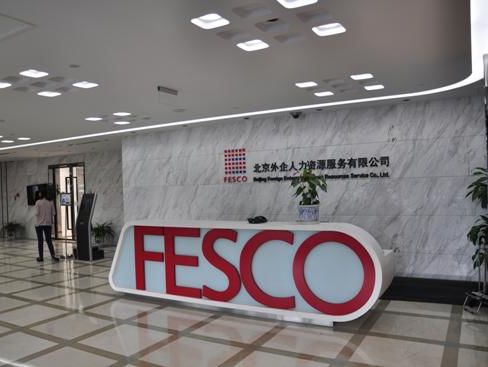Photo: image.baidu.cm
Finding and keeping talent, and the associated costs, continues to be a primary concern for foreign companies doing business in China, according to the annual business climate survey issued recently by an American business organization which boasts around 3500 individual members from over 1000 companies that are mostly influential and big in their industries.
The American Chamber of Commerce in the PRC (AmCham China) issues its China Business Climate Survey every year in the spring. It has long served as indicator for potential investors for deciding for whether or not to invest or expand in the world’s second largest economy.
The data provided by the 2014 survey shows that finding and keeping employees, particularly manager-level staff, is a major challenge for foreign companies. And this leads to an inevitable growth in labor costs, noted in recent years as not only a major risk to companies’ operations, but also the competitiveness of China as an investment destination. Moreover, according to the survey, new visa laws and air quality also hinder foreign business in China in attracting and retaining talent.
“Human resources issues are most frequently complained by our members, so we had a special chapter to elaborate on it this year, Graham Norris, the communications director of AmCham, told sino-us.com.
In fact, most surveyed member companies have ranked human resources their No.1 business challenge in China for three year in a row since 2012. And the AmCham is definitely not the only one saying that foreign businesses are having trouble in finding the right talent.
A recent research by Wall Street Journal indicated that foreign businesses seem to have lost attraction among Chinese college graduates. Among a total of 50,000 Chinese college graduates, only 21% said they would like to find a position in a foreign business in China, while the share was 38% in 2013.
 For gaining a more comprehensive picture of the crisis now facing foreign companies in China, sino-us.com talked to Nimo Firooze, senior business development director of Career International (科锐国际), the biggest executive recruiter in China.
For gaining a more comprehensive picture of the crisis now facing foreign companies in China, sino-us.com talked to Nimo Firooze, senior business development director of Career International (科锐国际), the biggest executive recruiter in China.
Sino-US: Why do you think it's difficult to attract and retain executives and skilled workers for foreign businesses in China? Is the same problem also faced by the state-owned companies in China? Is it the same case in the US, or other developed economies?
Nimo Firooze: China’s talent landscape is changing: Competition from Chinese private companies is getting strong and the number of college graduates interested in foreign multinationals has fallen dramatically, yet surprisingly few foreign businesses are responding to the challenge.
It would not be a problem for the SOEs in China, at least not at this moment. Actually, at the current stage, they attract most of the Chinese qualified employees. The large-scale entry of foreign companies and ensuing rapid increase in salary in China had brought comprehensive reform of pay system in big state-owned enterprises. Chinese staff can get a variety of compensation and benefits in domestic companies now, especially the qualified managerial employees.
Western firms and their brands took a significant hit in the Great Recession. But the Chinese economy—and local career opportunities—continued to grow. Although the press refers to the “global” economic slowdown, China has largely escaped the effects: Its GDP rose more than 9% annually in 2008 and 2009. During that time Western companies reduced hiring, cut expenses, and in some cases resorted to layoffs.
Although there is no doubt that the American economy is innovation-driven, and that it is a place where entrepreneurial risk is valued and where ideas can be transformed into new products, thereby creating new markets and consequently new jobs, and there are a number of ongoing, long-term industrial and demographic shifts in the labor market, none of these factors can explain the recent rise in unemployment in America. For example, the relative decline in U.S. manufacturing jobs has been under way for a half century, and the rise in female employment dates back to the second half of the twentieth century.
Sino-US: Would you predict the situation to get worse with the Chinese government adopting new policies for social benefits?
Nimo Firooze: Yes. If the foreign businesses don’t take any measures to face the challenges from domestic companies, the answer would be yes. Previously, Western multinationals offered a workforce with an international perspective, career mobility beyond China. But today, a growing number of Chinese companies offer the same. Foreign businesses should face this situation and take stock of the talent requirements.
Sino-US: What would be your suggestion for foreign businesses concerning the challenge?
Nimo Firooze: There are four recommendations.
First, get better at offering what is important to employees.
People want opportunities to grow and develop in their career, they want to work for a boss with whom they are comfortable, and they want good pay. In China this is also true. Don't rely on your global employer branding strategies to attract top talent in China. Instead, you study what is most important to those you wish to attract in China and find ways to satisfy them.
Second, view China as a region.
Local employers are often more aware of and sensitive to the needs of relocating families between provinces. Western multinationals who strictly adhere to global relocation policies usually would not take this uniqueness within China into consideration and thus would find themselves at a disadvantage. Ask yourself if you have struck the right balance between global standards and local flexibility.
Third, balance foreign and local talent.
Due to greater demands and expectations being placed on multinational businesses in China, many multinationals continue to rely on foreign talents in key leadership and technical positions in China. There are pluses and minuses to this. From an attraction point-of-view, multinationals must have a clear workforce strategy. Western multinationals must find the right balance or run the risk of alienating top local talent who can do just as well or better career wise, and be more comfortable in a Chinese multinational company.
Fourth, hire the right leader to ensure the right team.
The strength of the China leader will determine the strength of the China leadership team. Top calibre China leaders are being tempted away from multinational companies to lead the local or group operations of local China companies. These leaders are proving to very good at attracting people from other multinationals and this causes a snow-ball effect. Foreign businesses need to retain their top China leader and actively ensure a leadership pipeline is in place for local succession.
Sino-US: Is it true that a lot of senior executives left China because of polluted air and water? And do you think foreign workers' visa difficulties would affect foreign businesses' operations in China?
Nimo Firooze: Yes, the severity of China's pollution might be sapping the country's talent, and hence, competitiveness. Smog also undermines China's aim of attracting overseas talent - as many as 2 million people in all - from 2011 to 2015 to work in the mainland as part of the development drive. In a word, compensation remains secondary to health with others even enduring inconveniences just to live smog-free.
And yes, visa and residency regulations have been making it especially hard for foreign executives to navigate China’s immigration system, according to legal experts and business executives. Among other changes, the regulations have increased the processing time and paperwork requirements for residence permits and doubled most penalties for violations. Some cities—such as Beijing, Nanjing, and Suzhou—also require applicants for employment licenses to undergo criminal background checks.

 For gaining a more comprehensive picture of the crisis now facing foreign companies in China, sino-us.com talked to Nimo Firooze, senior business development director of Career International (科锐国际), the biggest executive recruiter in China.
For gaining a more comprehensive picture of the crisis now facing foreign companies in China, sino-us.com talked to Nimo Firooze, senior business development director of Career International (科锐国际), the biggest executive recruiter in China.